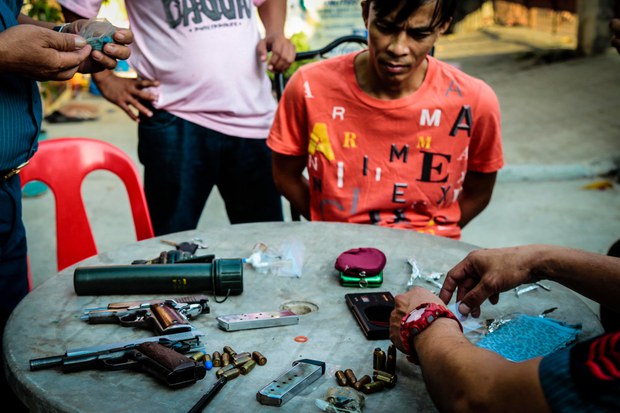Philippines Accuses Rights Group HRW of Deception in Drug-War Reporting
2018.01.26
Cotabato and Dagupan, Philippines
 Police confiscated weapons including pistols and grenades along with suspected methamphetamine and drug paraphernalia during a drug raid in Dagupan City, north of Manila, Jan. 23, 2018.
Police confiscated weapons including pistols and grenades along with suspected methamphetamine and drug paraphernalia during a drug raid in Dagupan City, north of Manila, Jan. 23, 2018.
Philippine officials demanded an apology Friday from Human Rights Watch (HRW), claiming it employed a strategy of deception in its reporting by painting the country as lawless in an anti-drug crackdown that has killed thousands.
In December, the U.S.-based global rights watchdog had criticized President Rodrigo Duterte for putting the national police back on the frontlines of his administration bloody war on narcotics.
HRW “has consistently and deliberately been misleading the international community by making it appear that the Philippines has become the Wild, Wild West of Asia where we just kill people left and right,” Foreign Secretary Alan Peter Cayetano said.
“To make such sweeping accusations without being able to support these claims with facts is not just misrepresentation. It is outright deception,” Cayetano added, challenging the rights group to explain “how it was able to arrive at its numbers” without any investigation on the ground.
Duterte previously stripped the force of a lead role in the crackdown following complaints about three teenagers who were gunned down by cops last year after being wrongfully suspected of being drug dealers. Within the past two weeks, at least five suspects have been killed and nearly 100 others arrested in police raids in the Philippines.
“The claims of Human Rights Watch that there are more than 12,000 victims in the campaign against illegal drugs could not be possible since this number failed to take into consideration the number of homicides and murders that have also been taking place all across the country,” Cayetano said.
“In making such a conclusion, Human Rights Watch is creating the impression that the Philippine government is engaged in the wholesale slaughter of innocent people. This assertion is false.”
‘Unfair accusations’
From the time Duterte took office in June 2016 until the end of November 2017, the national police recorded 18,491 homicides. Of this figure, 3,968 people were drug suspects killed in more than 80,000 police operations, in which at least 119,000 people were arrested.
The nearly 4,000 killings claimed by the government exclude the nightly slayings of drug suspects who were found with signboards proclaiming they were drug addicts or pushers. Police denied involvement in those deaths.
By contrast, during the first five years of the government of President Benigno Aquino III, official figures showed an average of at least 12,000 murders annually, Cayetano said.
HRW “owes the Philippines and the rest of the international community not just an explanation, but also an apology for making unfair accusations by skewing the real numbers just so it could advance its own agenda,” he said.
Groundless accusations
HRW defended its reporting on the Philippines, saying it sent researchers to join the police raids and learned that, in many of the cases, no due process was observed and alleged evidence was planted.
A self-confessed hitman who worked for Durterte’s “death squad” when he was mayor of the southern city of Davao and a former police officer who worked for the president testified in the Senate about killings. They also filed a murder complaint against Duterte at the International Criminal Court in The Hague.
Phelim Kine, HRW’s deputy Asia director, described Cayetano’s assertions as groundless, saying the Filipino foreign minister was the chief denier of growing accusations against Duterte’s state-sanctioned killings.
“They are the latest manifestation of the government’s distraction strategy that appears aimed to sideline domestic and international demands for accountability,” Kine said. HRW’s claim of 12,000 deaths was based on independent estimates by NGOs and media outlets covering the drug war over the past 18 months, he noted.
He said Cayetano had also told the U.N. General Assembly in September that the drug war was a “necessary instrument to preserve and protect the rights of all Filipinos and was never an instrument to violate human rights.
“That demonstrably false declaration did more than add gross insult to injury for family members of the anti-drug campaign’s victims, including children,” Kine said, adding that those who questioned the drug war were harassed.
This includes a senator who has been jailed since February 2017 after leading criticism of Duterte’s drug war and the recent closure of an online news website that had tracked the increasing number of killings.
“What you won’t hear is Cayetano calling for justice for those thousands of deaths,” Kine said. “The government has made no genuine efforts to seek accountability for drug war abuses.”
Duterte has said in public speeches that he would reinstate, pardon or even promote police officers convicted of killing in the drug war.
Cayetano said HRW and other groups had ignored the rights of the law enforcers to protect themselves, noting that 86 officers and soldiers had been killed and more than 200 others wounded when drug suspects fought back.
“Instead of outrightly crucifying us, Human Rights Watch may perhaps wish to hear the stories of these victims so that it would be able to understand the extent of the problem that we are confronted with. It should also ask ordinary Filipinos how they feel about their government’s efforts to ensure their personal safety and security,” Cayetano said.







